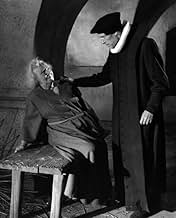The young wife of an aging priest falls in love with his son amidst the horror of a merciless witch hunt in 17th-century Denmark.The young wife of an aging priest falls in love with his son amidst the horror of a merciless witch hunt in 17th-century Denmark.The young wife of an aging priest falls in love with his son amidst the horror of a merciless witch hunt in 17th-century Denmark.
- Awards
- 1 win & 1 nomination total
Thorkild Roose
- Rev. Absalon Pederssøn
- (uncredited)
Sigrid Neiiendam
- Merete (Absalon's mother)
- (uncredited)
Albert Høeberg
- The Bishop
- (uncredited)
Preben Neergaard
- Degn
- (uncredited)
Anna Svierkier
- Herlofs Marte
- (uncredited)
Olaf Ussing
- Laurentius
- (uncredited)
Storyline
Did you know
- TriviaThere was a gap of eleven years between this film and Dreyer's last feature, being Vampyr in 1932.
- GoofsThe film is set in 1623. But at the back of the main room, where much of the action takes place, is a large wooden chest with a Latin inscription: "Quodque parum novit nemo docere potest - Anno 1639."
- Quotes
Anne Pedersdotter: I see through my tears, but no one comes to wipe them away.
Featured review
One of Dreyer's most accessible works; it has a dramatic story (witch hunting!) and still investigates the characters' morality and their relation to the world they exist in. This film is about the difference between life and the soul (the life that you live now and the soul of post-life, and the soul that fills your life as you live it), those at the stake and those on trial in the home, and the spells we cast on each other. When an accused witch confesses to being one to hopefully save her life (which doesn't happen) she threatens with witchery the man who won't save her. Obviously witches don't exist, but why, when sentenced to death, would she suddenly say she has a witch's power? To frighten him? Because she believes that she must be a witch, if others think she is? Or just to scare him? It's not clear. This is Dreyer's most overtly sexual film, where sex is a weapon (that eventually leads to a death); we see the relationship between the young girl, Anne, who falls in love with her much older husband's son (the same actor who played Johannes in Dreyer's next great film, "Ordet"), and, by the end of the film, we see that she has cast her spell on him, and is herself to be accused of being a witch.
Dreyer's films, which got more difficult as he got older, don't seem to have a date; certainly period pieces like this exist in a certain time, but put "Day of Wrath" next to "Gertrud" and you'd hardly notice a twenty year difference -- or few hundred years difference, in terms of the setting. And yet Dreyer's sense of place is almost unmatched, largely because of his simplicity: the costumes seem almost amateur, the acting is theatrical -- not so much in style, but in presentation (the actors seem to have been told where to stand and when). His films exist purely within this world he created, not minding the styles of the day; he's the truest of auteurs. He is also one of the great directors of women, and here elicits excellent performances from his entire cast (keeping in mind the date of production) but especially those of the two mothers in the film, the one who is put to the stake, and the other who is the mother to Anne's much older husband.
Despite the heavy seriousness of the religious beliefs in the film, Dreyer isn't religiously driven. He is driven by the soul, but these films are not the works of a fundamentalist. Dreyer looks at the actions of the characters, which are, at their worst, adultery and murder, and uses them as a moral, spiritual, and personal crisis in which to look for nothing less than meaning in life. 9/10
Dreyer's films, which got more difficult as he got older, don't seem to have a date; certainly period pieces like this exist in a certain time, but put "Day of Wrath" next to "Gertrud" and you'd hardly notice a twenty year difference -- or few hundred years difference, in terms of the setting. And yet Dreyer's sense of place is almost unmatched, largely because of his simplicity: the costumes seem almost amateur, the acting is theatrical -- not so much in style, but in presentation (the actors seem to have been told where to stand and when). His films exist purely within this world he created, not minding the styles of the day; he's the truest of auteurs. He is also one of the great directors of women, and here elicits excellent performances from his entire cast (keeping in mind the date of production) but especially those of the two mothers in the film, the one who is put to the stake, and the other who is the mother to Anne's much older husband.
Despite the heavy seriousness of the religious beliefs in the film, Dreyer isn't religiously driven. He is driven by the soul, but these films are not the works of a fundamentalist. Dreyer looks at the actions of the characters, which are, at their worst, adultery and murder, and uses them as a moral, spiritual, and personal crisis in which to look for nothing less than meaning in life. 9/10
- desperateliving
- Sep 1, 2004
- Permalink
- How long is Day of Wrath?Powered by Alexa
Details
- Release date
- Country of origin
- Language
- Also known as
- El día de la ira
- Production company
- See more company credits at IMDbPro
Box office
- Gross US & Canada
- $7,642
- Runtime1 hour 50 minutes
- Color
- Sound mix
- Aspect ratio
- 1.37 : 1
Contribute to this page
Suggest an edit or add missing content













